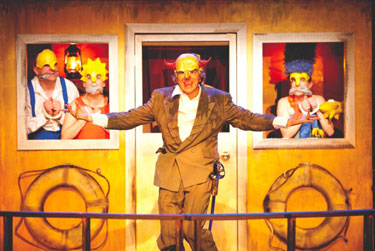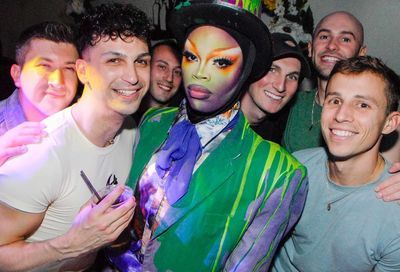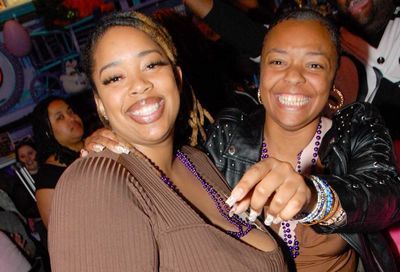Apocalypse Now
An interesting if underdeveloped idea, 'Mr. Burns' is the least-funny reference to 'The Simpsons' you'll ever see
The best way to approach Mr. Burns, a Post-Electric Play, is to forget how funny The Simpsons is. For although playwright Anne Washburn bases her play on a particular Simpson episode (the ”Cape Feare” parody of the Robert De Niro remake), this isn’t about tapping into the comic irreverence of the TV show. Not at all.
This is, in fact, what might be dubbed ”anthropological theater” in that it is far more a contemplation of human behavior than it is a narrative, let alone a comedy. In this case, is it Washburn’s vision as to how something as popular as, say, The Simpsons, might survive in the hearts and minds of a post-apocalyptic America.

Mr. Burns
(Photo by Scott Suchman)
Now if this sounds more academic than entertaining, you would be half right. For though Washburn’s process (it was workshopped by a ”documentary theater company”) has, at its kernel, an intellectually interesting idea, developing it and then making it an engaging piece of theater are separate matters. Luckily, it’s a broad-shouldered ensemble that carries the Woolly production and, even if the premise fails to move you, the skill with which the cast navigates it should.
Grounding Washburn’s chronology is a first act in which a group hunkering in a post-apocalyptic forest comfort themselves with attempts to recreate the ”Cape Feare” episode of The Simpsons. Though Washburn’s writing never quite captures this kind of ”remember when” encounter (nor the irony of how dire these can be), the ensemble injects a spontaneity that goes a long way. And as the sinister nature of their circumstances unfolds, they nicely project their tamped-down terror.
Kimberly Gilbert as Jenny and Steve Rosen as Matt, in particular, bring credibility to their characters and smooth the overwritten edges of an act serving as prelude to Washburn’s later process. Quietly charismatic, Gilbert gives Jenny a compelling believability even when Washburn disrupts the flow. (”I have a sister,” Jenny blurts upon the arrival of a stranger, an abruptness of non sequitur found only in plays.) As the irrepressible Matt, happy to fill the awkward silences with his unabashed Simpson‘s obsession, Rosen offers almost enough guileless enthusiasm to compensate for the overcooked writing.
As Gibson, the stranger stumbling across the encampment, Chris Genebach also skillfully bridges some of Washburn’s more awkward moments, giving his traveler an engagingly hopeful benevolence. Jenna Sokolowski is also memorable even if her Maria exudes more the bright-faced earnestness of musical theater than a survivor of nuclear disaster. Joining the proceedings for Acts 2 and 3, Ericka Rose makes for an extremely engaging Quincy (delivering some of the more drily amusing moments) and later plays her Bart with a surrealistic intensity of memorable weirdness. James Sugg as Sam carries off a ridiculous man-hug with enough aplomb to avert giggles and later plays his Mr. Burns to the musical theater hilt, as required. Amy McWilliams seems like she belongs in another play, but acquits herself well once the music starts.
But the cast’s ability to project the anxiety and camaraderie of their dire new world is only a small part of Washburn’s vision, and by Act 2, set a number of years later, interaction coexists with performance. As the characters, now a troupe, prepare and perform a mini music revue and then a simulated Simpson moment, remembered lines and songs have evolved into fought-over currency, exchanged with a post-apocalyptic audience that ultimately includes us. Though her comment remains clear and the ensemble carries the transition well, Washburn’s vision excludes too much and settles for too little.
By Act 3, set 75 years later, we discover that, in Washburn’s universe, along with the cockroaches so survives the genre of musical theater, fully intact. Thus, presented in toto we view a ”Cape Fear” denouement short on wit and long on campy villainous posturing and an uncharacteristically long-winded Bart. Though the idea of the oral historical as impacted by disaster remains inventive, it is quickly beaten to death (unlike Bart) by the requirements of the genre. Washburn’s time-morphed cultural references, raised and dropped like billboards, never get beyond the ho-hum.


To July 1
Woolly Mammoth Theatre Co.
641 D St. NW
$30 to $72.50
202-393-3939
woollymammoth.net
Thus, the final act is heavy-handed, generally tiresome and painfully long (unless you love musical theater, in which case you will find it enthralling, effective and way too short).
Of course, Washburn belabors the references in order to show the evolution of the iconography – and it does evolve, at least in one (overplayed) way. But knowing this does little to defray the lack of irony, insight or the persistent feeling of ”Okay, I get it. So now what?” The bottom line is that when Washburn leaves her campers in the woods, she fails to replace them with anything nearly as compelling.
Still, credit where it is due, the cast segues into the musical theater with much verve and energy, and director Steve Cosson ensures that the challenging transitions and leaps between genres are managed smoothly and at pace.
And so a well-crafted production of an interesting, if under-developed, idea is probably the least-funny reference to The Simpsons you’ll ever see.
Support Metro Weekly’s Journalism
These are challenging times for news organizations. And yet it’s crucial we stay active and provide vital resources and information to both our local readers and the world. So won’t you please take a moment and consider supporting Metro Weekly with a membership? For as little as $5 a month, you can help ensure Metro Weekly magazine and MetroWeekly.com remain free, viable resources as we provide the best, most diverse, culturally-resonant LGBTQ coverage in both the D.C. region and around the world. Memberships come with exclusive perks and discounts, your own personal digital delivery of each week’s magazine (and an archive), access to our Member's Lounge when it launches this fall, and exclusive members-only items like Metro Weekly Membership Mugs and Tote Bags! Check out all our membership levels here and please join us today!























